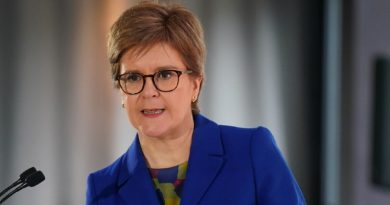SNP crushed after expert said independent Scotland could not join EU without central bank
Nicola Sturgeon criticised over calls to rejoin EU by expert
We use your sign-up to provide content in ways you’ve consented to and to improve our understanding of you. This may include adverts from us and 3rd parties based on our understanding. You can unsubscribe at any time. More info
First Minister Nicola Sturgeon and her Scottish National Party (SNP) are drawing up plans for Scotland to leave the UK as soon as the coronavirus pandemic is over. A second independence referendum is high on the SNP’s agenda, with support being strengthened by the pandemic and Ms Sturgeon’s victory at Holyrood’s May elections – just one shy of a majority. However, a few obstacles do remain between where Scotland is today and where it wants to be post-independence.
One of the biggest issues is currency and what tender Scotland would use outside the Union.
Ms Sturgeon has claimed the country would continue to use sterling for “as long as necessary”.
But a Government white paper compiled by the Economic Affairs Committee ahead of the 2014 independence vote said this is “not a viable option”.
It noted: “The choice of currency is perhaps the most important economic decision an independent Scottish government would face.”

While an independent Scotland could continue using sterling without the rest of the UK’s consent in the same way some Latin American countries have adopted the US dollar and Montenegro uses the euro, the country would have no central bank and no access to the services of, or influence over, the Bank of England.
Yet, Scotland has a large financial services sector that relies on access to central bank services.
Moreover, at the time, Olli Rehn, the former European commissioner for monetary union and the euro, wrote to Danny Alexander, then-chief secretary of the Treasury, to say having a central bank was an essential requirement of EU membership.
Now an MEP, Mr Rehn said in a letter that the SNP’s apparent plan to use the pound without the formal permission of London – a policy known as “sterlingisation” – would “simply not be possible”.
JUST IN: EU snub after Iceland walked out of fishing talks


Mr Rehn said the currency issue arose because “that would obviously imply a situation where the candidate country concerned would not have a monetary authority of its own and thus no necessary instruments of the EMU [economic and monetary union]”.
He wrote that a core part of any new membership negotiation was for the applicant to commit themselves to EMU, and that implied the “will and expected capacity” to meet the tests for joining the euro – a policy former SNP leader Alex Salmond repeatedly rejected.
Mr Alexander said Mr Rehn’s views were a fatal blow to repeated suggestions by the SNP that an independent Scotland could have used the pound freely if the UK Government refused to set up a formal sterling zone.
Mr Alexander said sterlingisation “is not only a bonkers idea, which flies in the face of any reasonable notion of what independence means and which would impose costs and risks on people and businesses in Scotland, it is also incompatible with Scotland’s smooth re-entry into the EU”.
In an exclusive interview with Express.co.uk last year, Ronald MacDonald, research professor of macroeconomics and international finance at Glasgow University’s Adam Smith Business School, also cast a shadow over the SNP’s currency plan.
DON’T MISS:
EU’s accession to CPTPP branded ‘impossible’ [EXCLUSIVE]
Experts pinpoint huge opportunities of new trade scheme [REVEALED]
EU snub after Iceland walked out of fishing talks [INSIGHT]


He said: “Their strategy for an independent Scotland is to have a relatively long transition period where they continue to use sterling.
“Borrowing in a foreign currency is a very dangerous strategy, particularly if you are borrowing the kind of sums of money they are talking about.
“The reason for that is that if you adopt sterlingisation that is a form of a rigidly fixed exchange rate.
“The UK has a flexible exchange rate. It means that when you get a shock to the economy, you have some means to adjust the economy to that.
“By adopting the currency of another country you really are fixing your currency against that currency. And you have got no means of adjustment.
“That is not tenable for an independent country.
“I have argued separately that it could lead to bankruptcy.
“They haven’t thought through the macroeconomic framework.”
He concluded: “It is a very complex mix and unfortunately that complex mix has not been spelt out to the electorate.
“That is my concern. I hope if there is another referendum campaign, people will start putting these arguments to them.”
Source: Read Full Article


